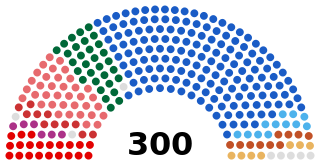
The United Nations General Assembly is one of the six principal organs of the United Nations (UN), serving as its main deliberative, policymaking, and representative organ. Currently in its 78th session, its powers, composition, functions, and procedures are set out in Chapter IV of the United Nations Charter.

Parliamentary procedures are the accepted rules, ethics, and customs governing meetings of an assembly or organization. Their object is to allow orderly deliberation upon questions of interest to the organization and thus to arrive at the sense or the will of the majority of the assembly upon these questions. Self-governing organizations follow parliamentary procedure to debate and reach group decisions, usually by vote, with the least possible friction.

The Chinese People's Political Consultative Conference (CPPCC) is a political advisory body in the People's Republic of China and a central part of the Chinese Communist Party (CCP)'s united front system. Its members advise and put proposals for political and social issues to government bodies. However, the CPPCC is a body without real legislative power. While consultation does take place, it is supervised and directed by the CCP.

The Standing Committee of the National People's Congress (NPCSC) is the permanent body of the National People's Congress (NPC), the national legislature of China. It exercises the powers of the NPC when it is not in session.

A quorum is the minimum number of members of a group necessary to constitute the group at a meeting. In a deliberative assembly, a quorum is necessary to conduct the business of that group. According to Robert's Rules of Order Newly Revised, the "requirement for a quorum is protection against totally unrepresentative action in the name of the body by an unduly small number of persons." In contrast, a plenum is a meeting of the full body. A body, or a meeting or vote of it, is quorate if a quorum is present.

The Congress of Deputies is the lower house of the Cortes Generales, Spain's legislative branch, the upper house being the Senate. The Congress meets in the Palace of the Parliament in Madrid.

The Pan-African Parliament (PAP), also known as the African Parliament, is the legislative body of the African Union. It held its inaugural session in March 2004. The Parliament exercises oversight, and has advisory and consultative powers, having lasting for the first five years. Initially the seat of the Pan-African Parliament was in Addis Ababa, Ethiopia, but was later moved to Midrand, South Africa. The goal in establishing the parliament was creating a space where people from all states of Africa could meet, deliberate, and pass some policy on issues that affect the entire continent of Africa.

The Senate is one of the two chambers of the bicameral Federal Parliament of Belgium, the other being the Chamber of Representatives. It is considered to be the "upper house" of the Federal Parliament. Created in 1831 as a chamber fully equal to the Chamber of Representatives, it has undergone several reforms in the past, most notably in 1993 and 2014. The 2014 elections were the first without a direct election of senators. Instead, the new Senate is composed of members of community and regional parliaments and co-opted members. It is a chamber of the communities and regions and serves as a platform for discussion and reflection about matters between these federated entities. The Senate today plays a minor role in the federal legislative process. However, the Senate, together with the Chamber, has full competence for the Constitution and legislation on the organization and functioning of the Federal State and the federated entities. Since the reform of 2014, it holds about ten plenary sessions a year.

The Parliament of the Hellenes, commonly known as the Hellenic Parliament, is the unicameral legislature of Greece, located in the Old Royal Palace, overlooking Syntagma Square in Athens. The parliament is the supreme democratic institution that represents the citizens through an elected body of Members of Parliament (MPs).
The Standing Rules of the Senate are the parliamentary procedures adopted by the United States Senate that govern its procedure. The Senate's power to establish rules derives from Article One, Section 5 of the United States Constitution: "Each House may determine the rules of its proceedings ..."

The NATO Parliamentary Assembly serves as the consultative interparliamentary organisation for the North Atlantic Treaty Organization. Its current President is Michał Szczerba from Poland, elected in 2023. Its current Secretary General is Ruxandra Popa, who has been in this position since January 2020.

The Chamber of Representatives is one of the two chambers in the bicameral Federal Parliament of Belgium, the other being the Senate. It is considered to be the "lower house" of the Federal Parliament.

The Llywydd, or Presiding Officer in English, is the speaker of the Senedd in Wales, elected by members of the Senedd to chair their meetings ; to maintain order; and to protect the rights of Members.
A committee of the whole is a meeting of a legislative or deliberative assembly using procedural rules that are based on those of a committee, except that in this case the committee includes all members of the assembly. As with other (standing) committees, the activities of a committee of the whole are limited to considering and making recommendations on matters that the assembly has referred to it; it cannot take up other matters or vote directly on the assembly's business. The purpose of a committee of the whole is to relax the usual limits on debate, allowing a more open exchange of views without the urgency of a final vote. Debates in a committee of the whole may be recorded but are often excluded from the assembly's minutes. After debating, the committee submits its conclusions to the assembly and business continues according to the normal rules.

The Assembly of the Western European Union, also called the European Security and Defence Assembly, was a parliamentary assembly for delegations from the national parliaments of the member countries of the Western European Union (WEU), a security and defence organisation. Its final session was on 10 May 2011.
In certain countries, a motion in parliamentary procedure is a formal proposal by a member of a deliberative assembly that the assembly take certain action. Such motions, and the form they take are specified by the deliberate assembly and/or a pre-agreed volume detailing parliamentary procedure, such as Robert's Rules of Order; The Standard Code of Parliamentary Procedure; or Lord Citrine's The ABC of Chairmanship. Motions are used in conducting business in almost all legislative bodies worldwide, and are used in meetings of many church vestries, corporate boards, and fraternal organizations.

An Act of Parliament in the United Kingdom is primary legislation passed by the UK Parliament in Westminster, London.

Procedures of the United States Congress are established ways of doing legislative business. Congress has two-year terms with one session each year. There are rules and procedures, often complex, which guide how it converts ideas for legislation into laws.

The National People's Congress (NPC) is the highest organ of state power of the People's Republic of China. The NPC is the only branch of government in China, and per the principle of unified power, all state organs from the State Council to the Supreme People's Court (SPC) are subservient to it. With 2,977 members in 2023, it is the largest legislative body in the world. The NPC is elected for a term of five years. It holds annual sessions every spring, usually lasting from 10 to 14 days, in the Great Hall of the People on the west side of Tiananmen Square in Beijing.

The Bureaus of the Cortes Generales are the governing bodies of each House of the Cortes Generales, the legislative branch of Spain. The Bureaus are made up of the President or Speaker of the House, the Vice Presidents or Deputy Speakers and the Secretaries. Each Bureau is autonomously regulated by the standing orders of its house and its composition its not the same.
















